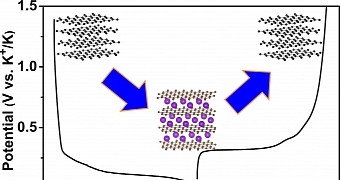Just like the electric cars that have been around since probably the car itself was invented, potassium-ion batteries have been "rediscovered," since scientists looked into the matter 83 years ago and it then was decided that potassium and graphite didn't work well together.
According to a study carried out at the Oregon State University (OSU), it has been discovered, or rather rediscovered, that potassium-ion batteries are a very good alternative to the ubiquitous Lithium-ion batteries.
Knowing that potassium-ion was tested before as a possible battery power source, current-day scientists are shocked that nobody has actually highlighted that K-ion is actually reliable.
“For decades, people have assumed that potassium couldn’t work with graphite or other bulk carbon anodes in a battery,” said Xiulei (David) Ji, the lead author of the study and assistant professor of chemistry at the College of Science at Oregon State University. “It’s really shocking that no one ever reported on this issue for 83 years,” he continued.
Potassium-ion batteries might get cheaper and probably even just as good as lithium
But why researchers actually thought of potassium as an alternative to lithium in the first place? Well, because lithium is very rare. Although, paradoxically, we see lithium batteries everywhere, we're effectively consuming a very hard-to-recycle, extra rare metal that is only 0.0017 percent of the Earth’s crust, by weight. Do you wonder why batteries are expensive? Well, because we're consuming an extremely rare element.
Potassium by comparison is 880 times more abundant in the Earth’s crust than lithium, and although initially dismissed by scientists, apparently it can work great with graphite and soft carbon in the anode of an electrochemical battery.
Unfortunately, at the moment, these kind of power sources do not perform just as well as lithium-ion batteries, but they are easier to recycle, are hundreds of times more abundant, and if perfected, they may reach performance levels similar to lithium while being much cheaper.
According the OSU’s website, the team of scientists are now looking for support to further research and help commercialize the new potassium-based batteries. Who knows, maybe with the new ultrasound wireless charging technology, keeping our telephones alive will cost us infinitely less money.

 14 DAY TRIAL //
14 DAY TRIAL //